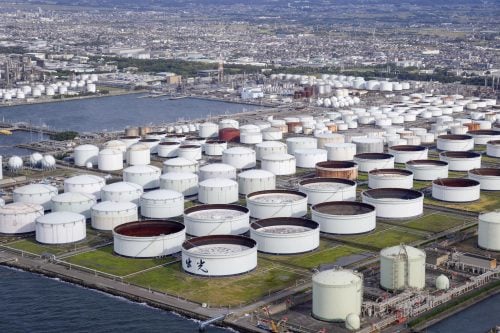Crude oil prices rose at the end of trading today, Tuesday, April 4 (2023), to continue to reap gains for the fourth consecutive session, supported by OPEC + moves aimed at stabilizing the markets.
And 9 of the countries of the OPEC + coalition, led by Saudi Arabia, decided to make voluntary production cuts of 1.66 million barrels per day, as a precautionary measure aimed at supporting the stability of the oil market.
Crude oil prices had turned lower before rebounding as investors turned their attention to demand trends and the impact of higher prices on the global economy.
Crude oil prices today
At the end of the session, benchmark Brent crude futures – for June 2023 delivery – rose marginally by 1 cent, recording $84.94 a barrel, after it ranged between $86 and $83.82 a barrel during trading.
West Texas Intermediate crude futures – for May 2023 delivery – also increased by 0.4%, recording $80.71 a barrel, the highest level since January 26, 2023, according to what was seen by the specialized energy platform.
And crude oil prices ended their dealings, yesterday, Monday, April 3, with an increase of more than 6%, supported by the decisions of the OPEC + countries to reduce production targets by 1.66 million barrels per day.
The latest pledges raise the total volume of OPEC+ cuts to 3.66 million barrels per day, including a cut of two million barrels in October, equivalent to about 3.7% of global demand.

Oil market analysis
“The buying wave from the OPEC+ production cut has subsided, and the market’s attention has shifted to future demand expectations,” said Hiroyuki Kikukawa, head of NS Trading, a unit of Nissan Securities.
He added, “In the short term, demand is expected to increase for the summer driving season, but higher crude oil prices may increase inflationary pressures, and prolong interest rate increases in many countries, which may weaken demand.”
Kikukawa noted that the impact could renew concerns about the global financial industry, Reuters reported.
Oil price forecast
The moves to cut OPEC+ production prompted most analysts to raise their forecast for Brent oil prices to around $100 a barrel by the end of the year.
Goldman Sachs raised its forecast for Brent crude to $95 a barrel by the end of this year, and $100 for 2024.
For his part, the energy platform editorial advisor, energy economics expert, Dr. Anas Al-Hajji, believes that the announcement of the OPEC + countries aims primarily at not declining crude oil prices during the second half of this year, amid indications of a decline in demand.
global inflation crisis
Investors’ concerns about rising costs for businesses and consumers increased, raising fears that an inflationary shock to the global economy from higher oil prices would lead to further interest rate hikes.
Market watchers were trying to gauge how long the US Federal Reserve might need to keep raising interest rates to calm inflation, and whether the US economy was heading into recession.
Manufacturing activity in the US fell to its lowest level in nearly 3 years in March and could fall further due to tighter credit and higher borrowing costs.
“If crude oil can break the strong resistance band at $82/$83, it could return to the mid-$90s,” said Tony Sycamore, market analyst at IG.
related topics..
Also read..

Leave a Reply